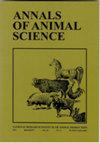屠宰猪胴体病变的流行及其对福利、胴体组成和肉品质的影响
IF 2.2
4区 农林科学
Q2 AGRICULTURE, DAIRY & ANIMAL SCIENCE
引用次数: 3
摘要
摘要本研究旨在确定屠宰猪胴体病变的患病率,并量化其与不同动物特征、屠宰前因素、血液测量、生产性能指标、胴体组成和肉质性状之间的关系。数据记录了30次旅行,涉及来自15个商业小规模肥育场的1080头市场体重猪。在屠宰线上对胴体的不同部位,即前、中、后,采用三分制对胴体病变进行视觉评估。检查全血细胞计数。测定了肉牛的生产性能指标和胴体组成性状:平均终生日增重、活胴体重、热胴体重和冷胴体重、冷收缩率、屠宰率、背膘厚度和肉度。在死后45分钟测量肉的pH值和温度。在30批屠宰的1080头猪中,70.28%的胴体出现一定程度的病变(中度~ 30.00%;严重- 40.28%)。胴体病变以猪胴体后部最常见(50.20%)。ryr1基因型、活重、负重密度、放养时间、放养密度和屠宰季节影响胴体病变患病率。胴体病变的存在,无论其严重程度如何,都与屠宰猪的血液测量变化有关,表明动物福利受损。屠宰猪的严重胴体损伤与肉pH45min升高显著相关,这导致黑、硬和干猪肉的发生率最高。相比之下,有很强的证据表明,屠宰猪的中度胴体病变与肉pH45min降低和肉T45min增加之间存在关联,这导致胴体病变组中白色、柔软和渗出猪肉的发生率最高。总之,本研究表明,在屠宰的生猪中,胴体病变的发生率很高,其发生的风险受到动物特征和屠宰前条件的影响。此外,屠宰猪胴体病变的存在,无论其严重程度如何,都与血液测量和猪肉质量的改变显著相关。本文章由计算机程序翻译,如有差异,请以英文原文为准。
Prevalence of carcass lesions and their effects on welfare, carcass composition and meat quality in slaughtered pigs
Abstract The aims of this study were to determine the prevalence of carcass lesions in slaughtered pigs and to quantify their relationships with different animal characteristics, pre-slaughter factors, blood measurements, performance indices, carcass composition and meat quality traits. Data was recorded for 30 journeys referring to 1080 market-weight pigs that originated from 15 commercial small-scale finishing farms. Carcass lesions were visually assessed on the slaughterline in different parts of the carcass, i.e., anterior, middle and posterior, using a three-point scale. Complete blood count was investigated. The following performance indices and carcass composition traits were measured: average lifetime daily weight gain, live, hot and cold carcass weights, cooler shrinkage, dressing percentage, backfat thickness and meatiness. Meat pH and temperature were measured 45 minutes postmortem. Of the 1080 pigs slaughtered in 30 batches, 70.28% displayed some degree of lesions on the carcass (moderate – 30.00%; severe – 40.28%). The carcass lesions were the most prevalent (50.20%) in the posterior part of the pig carcass. RYR 1 genotype, live weight, loading density, lairage time, lairage density and slaughter season affected the carcass lesion prevalence. The presence of carcass lesions, irrespective of severity, was associated with alterations in blood measurements in slaughtered pigs, indicating compromised animal welfare. The presence of severe carcass lesions in slaughtered pigs was significantly associated with increased meat pH45min, which led to the highest occurrence of dark, firm and dry pork. In contrast, there was strong evidence of association between the presence of moderate carcass lesions in slaughtered pigs and both decreased meat pH45min and increased meat T45min, which led to the highest occurrence of pale, soft and exudative pork among the carcass lesion groups. In conclusion, this study showed a high prevalence of carcass lesions in slaughtered pigs, whereby the risk of their occurrence was affected by both animal characteristics and pre-slaughter conditions. Also, the presence of carcass lesions in slaughtered pigs, irrespective of severity, was significantly associated with alterations in the blood measurements and pork quality.
求助全文
通过发布文献求助,成功后即可免费获取论文全文。
去求助
来源期刊

Annals of Animal Science
农林科学-奶制品与动物科学
CiteScore
4.00
自引率
5.30%
发文量
138
审稿时长
6-12 weeks
期刊介绍:
Annals of Animal Science accepts original papers and reviews from the different topics of animal science: genetic and farm animal breeding, the biology, physiology and reproduction of animals, animal nutrition and feedstuffs, environment, hygiene and animal production technology, quality of animal origin products, economics and the organization of animal production.
 求助内容:
求助内容: 应助结果提醒方式:
应助结果提醒方式:


